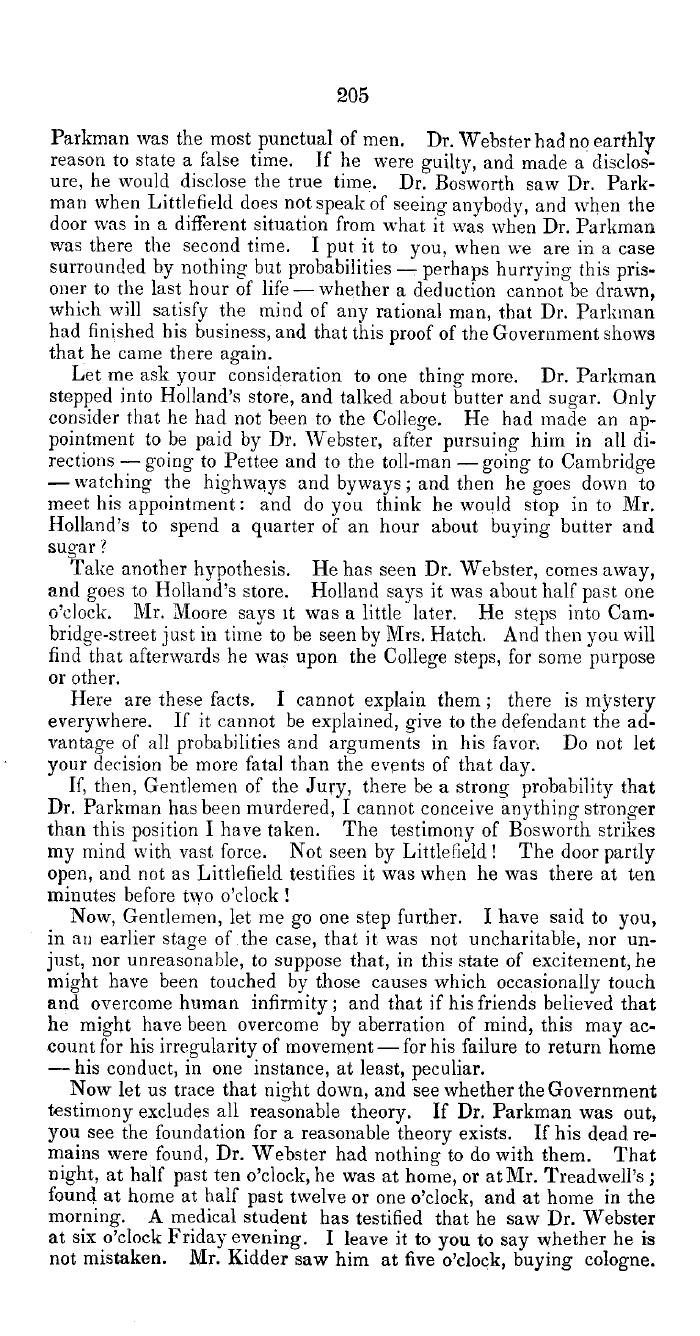|
205
Parkman was the most punctual of men. Dr. Webster had no earthly
reason to state a false time. If he were guilty, and made a disclos-
ure, he would disclose the true time. Dr. Bosworth saw Dr. Park-
man when Littlefield does not speak of seeing anybody, and when the
door was in a different situation from what it was when Dr. Parkman
was there the second time. I put it to you, when we are in a case
surrounded by nothing but probabilities-perhaps hurrying this pris-
oner to the last hour of life-whether a deduction cannot be drawn,
which will satisfy the mind of any rational man, that Dr. Parkman
had finished his business, and that this proof of the Government shows
that he came there again.
Let me ask your consideration to one thing more. Dr. Parkman
stepped into Holland's store, and talked about butter and sugar. Only
consider that he had not been to the College. He had made an ap-
pointment to be paid by Dr. Webster, after pursuing him in all di-
rections-going to Pettee and to the toll-man-going to Cambridge
-watching the highways and byways; and then he goes down to
meet his appointment: and do you think he would stop in to Mr.
Holland's to spend a quarter of an hour about buying butter and
sugar?
Take another hypothesis. He has seen Dr. Webster, comes away,
and goes to Holland's store. Holland says it was about half past one
o'clock. Mr. Moore says it was a little later. He steps into Cam-
bridge-street just in time to be seen by Mrs. Hatch. And then you will
find that afterwards he was upon the College steps, for some purpose
or other.
Here are these facts. I cannot explain them ; there is mystery
everywhere. If it cannot be explained, give to the defendant the ad-
vantage of all probabilities and arguments in his favor: Do not let
your decision be more fatal than the events of that day.
If, then, Gentlemen of the Jury, there be a strong probability that
Dr. Parkman has been murdered, I cannot conceive anything stronger
than this position I have taken. The testimony of Bosworth strikes
my mind with vast force. Not seen by Littlefield! The door partly
open, and not as Littlefield testifies it was when he was there at ten
minutes before two o'clock !
Now, Gentlemen, let me go one step further. I have said to you,
in an earlier stage of the case, that it was not uncharitable, nor un-
just, nor unreasonable, to suppose that, in this state of excitement, he
might have been touched by those causes which occasionally touch
and overcome human infirmity; and that if his friends believed that
he might have been overcome by aberration of mind, this may ac-
count for his irregularity of movement-for his failure to return home
-his conduct, in one instance, at least, peculiar.
Now let us trace that night down, and see whether the Government
testimony excludes all reasonable theory. If Dr. Parkman was out,
you see the foundation for a reasonable theory exists. If his dead re-
mains were found, Dr. Webster had nothing to do with them. That
night, at half past ten o'clock, he was at home, or at Mr. Treadwell's ;
found at home at half past twelve or one o'clock, and at home in the
morning. A medical student has testified that he saw Dr. Webster
at six o'clock Friday evening. I leave it to you to say whether he is
not mistaken. Mr. Kidder saw him at five o'clock, buying cologne.
|

